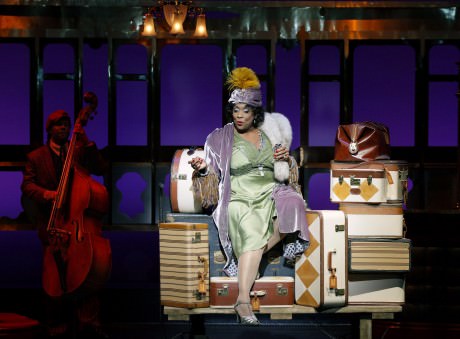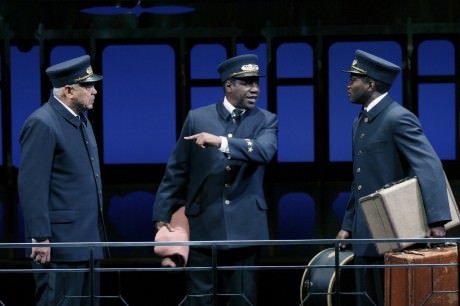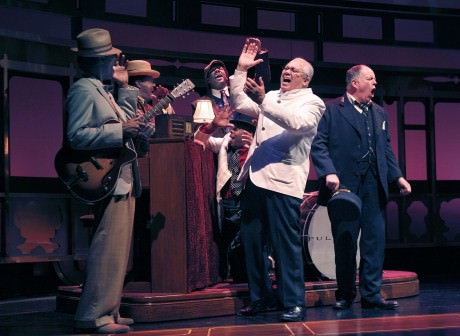E. Faye Butler returns to Arena Stage as Sister Juba in Pullman Porter Blues. E. Faye fills us in on the history of The Pullman Porters and how they helped African Americans to come into the middle class.

Joel: Pullman Porter Blues has come to DC after a successful world premiere at Seattle Repertory Theatre. Who from the Seattle production has come along to Arena Stage with you? And how did the run go in Seattle?
E. Faye: Everyone from the cast in Seattle has come to DC. Seattle Repertory Theatre seemed to be very pleased, as the show was a great success there!
What changes have they made that you feel have made the show better?
We are in the process of making changes and are currently in rehearsal.
Introduce us to Sister Juba who you play. What is E. Faye Butler-like about her? What do you like about this character?
Seattle Repertory Theatre has many of my qualities because I am the person playing her. Sister Juba is a very strong, broad blues singer who is as tough-as-nails on the outside and has many skeletons in her closet. She is a cross between Bessie Smith and Ma Rainey with lots of glamour!
What was Sister Juba’s job on the train, and what lessons did she learn when working on the train – that helped her become and succeed as a star?
Sister Juba was a maid on the Pullman train many years ago. Now she is a passenger on her way to New Orleans. Once you see the show, you’ll know that she really didn’t learn anything from working the trains that would specifically aid her as a singer.
How has your performance as Sister Juba grown since the first time you performed it?
The more you listen to the characters and continue to read the script, things just naturally change. Listening is the key to growth. I couldn’t put my finger on one thing that has changed, but I’m constantly learning, that’s for sure.
How did Director Lisa Peterson help shape your performance?
She was very helpful in bringing the world of the train to life and knowing the do’s and don’ts of the period. She has worked on this project for two years and has insight into Cheryl’s way of thinking and a passion for the story. She also doesn’t want you to look bad on stage.
You played Aunt Eller in the smash hit Oklahoma! here at Arena Stage. Are there any similar characteristics that Aunt Eller and Sister Juba share?
I don’t think there are, besides the fact that they’re both women who have to forge their way through life, doing the best they can. Of course, I happened to help create and shape both of them.

Who were the Pullman Porters? Please introduce us to the three generations of Sykes who are the porters working on the Panama Limited and the actors who play them.
The three actors are Cleavant Derricks, Larry Marshall and Warner Miller. They play three generations of porters — a young college student, his father working on the train for 20 years and the grandfather working on the train 50 years. Pullman porters were the waiters of the luxury train that went all around the country. Each route had a different name, and the route we’re on is the Panama Limited, which ran from Chicago to New Orleans. The porters’ job was to ensure the passengers (mainly white) had the best of everything while on the train – the finest cloth, china, food, liquors, basically a grand hotel on wheels. The porters weren’t allowed to sleep on their routes and were on their feet for the full length of the ride.
What were some of the benefits of working as a Pullman Porter, and what negative experiences did the Pullman Porters face working on the train?
Being an African-American man in that period of history was very hard. Racism was the order of the day – although, you must remember that being a porter was the best job an African-American person could have after being a freed slave. The benefits were that you traveled the country and were in the company of stars, politicians, and people in the industry. It was a great way to learn about the world of the rich and famous and get stock tips – the tips were probably the best thing about the job! Porters made one-third of what the white conductors made.
How did The Pullman Porters help bring African Americans into the Middle Class and create a union?
Because the porters did make decent money, their wives were at home raising their families, so that was the beginning of the middle class for African-American families. To be a housewife just like white women were, they had dresses, cars, gowns, furs, and owned homes and properties. Their children could afford schools of their choice, college, social functions, etc.
The play takes place the night became the heavyweight championship of the world. How does his ‘win’ impact the play and the Pullman Porters and Sister Juba?
The championship doesn’t really affect Sister Juba. However, it does give Sylvester the belief that change is coming.
Talk about the music and songs you sing. How do these songs help tell the story?
The songs are a part of the story, and the story never stops for the music because it’s really a part of the text. This is not a musical, but it’s a play with music. The songs are traditional blues songs of the period, including music from Bessie Smith and Ma Rainey.
Did you get a chance to speak with Playwright Cheryl West and if you did – what advice or suggestions did she have for you about and on how to portray Sister Juba?
Yes, I worked with Cheryl, as she was an important part of our process. She doesn’t give advice, but she listens, which is why she is a great writer. She honestly hears what you say and isn’t afraid to change what doesn’t move the play forward. She trust that the actors and director will do their job.
How is Pullman Porter Blues timeless? Why is their story so important to tell to the new generation of African Americans in this country?
Everything old is new again. We are still struggling for equality for women, people of color, even the right to vote in many places. You never know where you can go until you know where you have been. The history and rich traditions of Pullman Porters have given us doctors, lawyers, community activists, government officials, teachers, actors and scientists. Every African-American person is only one to three degrees separated from a Pullman porter – ask you grandparents, mother, or father. The Brotherhood of Sleeping Car Porters was the first organized African-American union in this country. This is rich history and these men should never be forgotten. They paved the way in our American history. They are to be celebrated forever.

Pullman Porter Blues plays from November 23, 2012 to January 6, 2013 in The Kreeger Theater at Arena Stage at The Mead Center for American Theater – 1101 Sixth Street, SW, in Washington, DC. For tickets, call the box office (202) 488-3300, or purchase them online.
LINK
Read Jennifer Perry’s review of Pullman Porter Blues.




